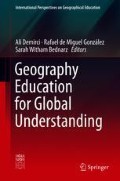Abstract
South Africa has had four school curricula changes in the post-apartheid era. The latest change occurred in 2011 when the Curriculum and Assessment Policy Statements (CAPS) were implemented in South African schools. In terms of the CAPS, geography is compulsory in the lower grades (Grades 4 to 9) and forms part of the natural and social sciences, while in the Further Education and Training band (FET, Grades 10 to 12), geography is an elective. The main global issues covered in the various sub-disciplines of geography in the FET phase include, for example, overpopulation; urban and industrial development and growth; trade and development; HIV/Aids; climate change; and ocean pollution. Unfortunately, Ecological Geography as a sub-discipline and the influence of humans on the environment are not as prominent as in the previous geography curriculum. Knowledge about geography themes alone will not generate individuals who feel part of a global community and have the necessary understanding of Earth’s large-scale problems. Instead, for geography education to effectively contribute to a global understanding, geography teachers must have the necessary subject knowledge and pedagogical content knowledge to encourage learners to actively engage in and take ownership of their learning experiences. This can be achieved by implementing learner-centred instructional approaches, e.g. problem-based learning (PBL), in which global issues constitute the central focus of themes being taught. These approaches will not only ensure good learning progression across school phases but also empower South African learners to become global participants in solving real-world problems.
Access this chapter
Tax calculation will be finalised at checkout
Purchases are for personal use only
References
Anyanwu, R., & Le Grange, L. (2017). The influence of teacher variables on climate change science literacy of Geography teachers in the Western Cape, South Africa. International Research in Geographical and Environmental Education https://doi.org/10.1080/10382046.2017.1330039.
Booysen, B. (2015). Toward a cooperative learning process in building social cohesion in a grade 10 geography classroom: Action research approach. Magister in Education: Stellenbosch University.
De Waal, E., & Grösser, M. M. (2009). Safety and security at school: A pedagogical perspective. Teaching and Teacher Education, 25(5), 697–706.
Dube, C. (2017). The uptake of education for sustainable development in geography curricula in South African schools. In H. Lotz-Sisitka, O. Shumba, J. Lupele, & D. Wilmot (Eds.), Schooling for sustainable development in Africa (pp. 93–106). Cham: Springer.
Eksteen, S., Pretorius, E., & Breetzke, G. (2012). South Africa: Teaching geography with gis across diverse technological contexts. In A.J. Milson, A. Demirci, & J.J. Kerski (Eds.), International perspecties on teaching and learning with gis in secondary schools (pp. 225–232). New York: Springer.
Fleischmann, E. M-L. (2016). A Framework for Interactive-GIS-Tutor integration within FET phase Geography. Ph.D., Potchefstroom North-West University.
Golightly, A., & Muniz, O. A. (2013). Are South African geography students ready for problem-based learning? Journal of Geography in Higher Education, 37(3), 432–455.
Golightly, A. (2016). Geography student tutors’ perceptions and experiences in problem-based learning tutorial sessions. Journal of Communication, 7(1), 20–33.
Golightly, A., & Raath, S. (2015). Geography education students’ approaches to learning in PBL. Journal of Geography, 114(2), 58–68.
Innes, L. (2012). South african school geography: Underpinning the foundation of geospatial competence. South African Journal of Geomatics, 1(1):92–108.
Jita, L. C., & Mokhele, M. L. (2014). When teacher clusters work: selected experiences of South African teachers with the cluster approach to professional development. South African Journal of Education, 34(2), 01–15.
Liu, Y., Bui, E. N., Chang, C., & Lossman, H. G. (2010). PBL-GIS in secondary geography education: Does it result in higher-order learning outcomes? Journal of Geography, 109(4), 150–158.
Madsen, L. M., & Rump, C. (2012). Considerations of how to study learning processes when students use GIS as an instrument for developing spatial thinking skills. Journal of Geography in Higher Education, 36(1), 97–116.
Raath, S., & Golightly, A. (2016). Geography education students’ experiences with a problem-based learning fieldwork activity. Journal of Geography. https://doi.org/10.1080/00221341.2016.1264059.
Reitano, P., & Harte, W. (2016). Geography pre-service teachers’ pedagogical content knowledge. Pedagogies: An International Journal, 11(4), 279–291.
Shulman, L. S. (1986). Those who understand: Knowledge growth in teaching. Educational Researcher, 15, 4–14.
South Africa. Department of Basic Education. (2011). Curriculum and assessment policy statement. Grades 10–12. Cape Town: Government Printing.
Traut, H. J. (2017). Creativity in initial teacher education: A case study in geography at Stellenbosch University. Doctor of Philosophy: Stellenbosch University.
Van der Westhuizen, C. P., & Golightly, A. (2015). VideoANT as web-based 2.0 technology in geography micro-teaching. Journal of Geography in Higher Education, 39(2), 420–436.
Wilmot, D., & Norton, S. (2004). Issues-based enquiry at two South African schools. Teaching Geography, 29, 128–132.
Author information
Authors and Affiliations
Corresponding author
Editor information
Editors and Affiliations
Rights and permissions
Copyright information
© 2018 Springer International Publishing AG, part of Springer Nature
About this chapter
Cite this chapter
van der Westhuizen, C.P., Golightly, A. (2018). Global Understanding in South Africa. In: Demirci, A., Miguel González, R., Bednarz, S. (eds) Geography Education for Global Understanding. International Perspectives on Geographical Education. Springer, Cham. https://doi.org/10.1007/978-3-319-77216-5_14
Download citation
DOI: https://doi.org/10.1007/978-3-319-77216-5_14
Published:
Publisher Name: Springer, Cham
Print ISBN: 978-3-319-77215-8
Online ISBN: 978-3-319-77216-5
eBook Packages: Social SciencesSocial Sciences (R0)

